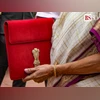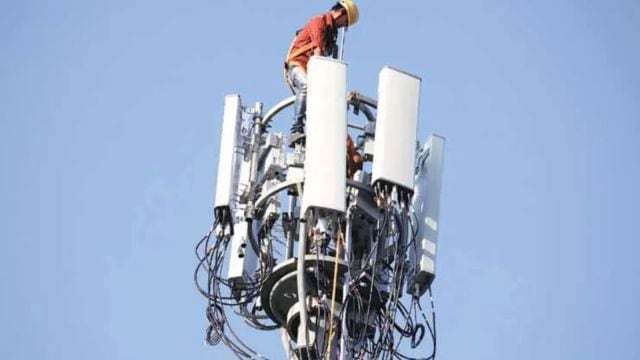-
07-24-2024, 02:10 PM
#331

Budget allocates Rs 1.28 trn for telecom ministry; BSNL to get Rs 82,916 cr
Of the total proposed allocation, over Rs 1 trillion is meant for BSNL and MTNL-related expenses, including Rs 82,916 crore infusion in BSNL for technology upgradation and restructuring at BSNL
)
The Government Has Proposed To Allocate Rs 3,668.97 Crore For Payment Of Principal Amount Of MTNL Bonds.
The government has proposed the allocation of Rs 1.28 trillion for telecom projects and public sector firms under the telecom ministry with a majority of funds earmarked for state-owned BSNL.
Of the total proposed allocation, over Rs 1 trillion is meant for BSNL and MTNL-related expenses, including Rs 82,916 crore infusion in BSNL for technology upgradation and restructuring at BSNL.
"The total net allocation for this demand in BE (Budget Estimate) 2024-25 is Rs 1,28,915.43 crore (Rs 1,11,915.43 crore plus Rs 17,000 crore). The additional provision of Rs 17,000 crore is met from the balances available under Universal Service Obligation Fund and will be utilised for schemes viz., Compensation to Telecom Service Providers, Bharatnet and Research and Development," the budget document said.
The budget has proposed to allocate Rs 17,510 crore for pensionary benefits of the employees of the Department of Telecommunications, including employees absorbed in Bharat Sanchar Nigam Ltd and employees of Mahanagar Telephone Nigam Ltd with effect from April 1, 2014.
The government has proposed to allocate Rs 3,668.97 crore for payment of principal amount of MTNL bonds.
The budget has made provision of Rs 34.46 crore for Technology Development and Investment Promotion, Rs 70 crore for Champion Service Sector Scheme and Rs 1,806.34 crore for Production Linked Incentive Scheme.
Besides the allocation, the government has proposed to increase import duty on motherboards, technically called printed circuit boards, by 5 per cent in the Union Budget 2024-25 to boost domestic telecom gear manufacturing.
"To incentivise domestic manufacturing, I propose to increase the BCD (Basic Customs Duty) from 10 per cent to 15 per cent on PCBA (printed circuit board assembly) of specified telecom equipment," Finance Minister Nirmala Sitharaman said.
The increase in basic customs duty for telecom PCB assembly comes with the exemption of critical minerals that are used in the manufacturing of communication equipment.
The finance minister proposed to fully exempt 25 minerals, such as lithium, copper, cobalt and rare earth elements, which are critical for sectors like nuclear energy, renewable energy, space, defence, telecommunications and high-tech electronics from customs duties and reduce basic customs duty on two of them.
"This will provide a major fillip to the processing and refining of such minerals and help secure their availability for these strategic and important sectors," Sitharaman said.
GX Group CEO Paritosh Prajapati said that the increased BCD on PCB assembly for telecom equipment supports local manufacturers and lowers costs for telecom OEMs (original equipment manufacturers). This development will invigorate the industry with renewed energy and confidence.
GX Group is one of the beneficiaries of the telecom PLI scheme.
Deloitte India, Partner and TMT industry leader Peeyush Vaish said an increase in BCD will boost domestic manufacturing of telecom equipment and it would have been more beneficial if the reduction was put in place two years ago when massive 5G deployment was happening in the country.
-
09-18-2024, 01:01 PM
#332

പോകുന്നിടത്തെല്ലാം വീട്ടിലെ വൈഫൈ; ബി.എസ്.എൻ.എൽ. ഇനി ‘സർവത്ര’
ടെലികോം രംഗത്തെ വിപ്ലവപദ്ധതി ട്രയല്*റണ്* കഴിഞ്ഞു, ആദ്യഘട്ടംതന്നെ കേരളത്തിൽ നടപ്പാക്കും

പത്തനംതിട്ട: വീട്ടിലെ ഫൈബർ കണക്ഷനിൽ കിട്ടുന്ന അതിവേഗ ഇന്റർനെറ്റ് വീടുവിട്ട് പുറത്തുപോകുമ്പോഴും വൈഫൈ ആയി കിട്ടാവുന്ന സംവിധാനം ബി.എസ്.എൻ.എൽ. കേരളത്തിൽ തുടങ്ങുന്നു. ‘സർവത്ര’ എന്ന പേരിൽ അവതരിപ്പിക്കുന്ന ഈ പദ്ധതി ടെലികോം രംഗത്തെ വിപ്ലവമായിമാറുമെന്നാണ് വിലയിരുത്തൽ. ട്രയൽ റൺ പൂർത്തിയായി. കേരളമുൾപ്പെടെയുള്ള സംസ്ഥാനങ്ങളിലാണ് ആദ്യം നടപ്പാക്കുക.
ബി.എസ്.എൻ.എലിന്റെ ചെയർമാനും മാനേജിങ് ഡയറക്ടറുമായ റോബർട്ട് ജെ. രവി മുന്നോട്ടുവെച്ച ആശയമാണ് ഇന്ത്യയിലെ ഗ്രാമങ്ങളിലേക്ക് ‘സർവത്ര’യായി എത്തുന്നത്. മൊബൈൽ ഡേറ്റയ്ക്കുവേണ്ടി ചെലവാകുന്ന തുക വലിയതോതിൽ കുറയ്ക്കാനാകുമെന്നതാണ് പ്രത്യേകത.
‘സർവത്ര’ ഇങ്ങനെ
വീട്ടിലോ സ്ഥാപനത്തിലോ എടുത്തിട്ടുള്ള ബി.എസ്.എൻ.എലിന്റെ ഫൈബർ ടു ദ ഹോം (എഫ്.ടി.ടി.എച്ച്.) ആണ് പദ്ധതിയുടെ അടിസ്ഥാനം
ഈ കണക്ഷനിലെ ഇന്റർനെറ്റ് ബി.എസ്.എൻ.എലിന്റെ മറ്റൊരു ഫൈബർ ടു ദ ഹോം കണക്ഷനുള്ള സ്ഥലത്തുപയോഗിക്കാം. ‘സർവത്ര’യുടെ പോർട്ടലിൽ രജിസ്റ്റർചെയ്യുന്ന എഫ്.ടി.ടി.എച്ച്. കണക്ഷനുകളിലൂടെയാണ് ഇത് സാധ്യമാകുക.
രജിസ്റ്റർചെയ്യുമ്പോൾ കണക്ഷനുകൾ ‘സർവത്ര എനേബിൾഡ്’ ആയിമാറും. പരമാവധി കണക്ഷനുകൾ രജിസ്റ്റർചെയ്യാൻ ബി.എസ്.എൻ.എൽ. അഭ്യർഥിക്കും.
‘സർവത്ര എനേബിൾഡ്’ ആണെങ്കിൽ രണ്ടാമത്തെ കണക്ഷന്റെ വൈഫൈ പാസ് വേഡോ യൂസർ ഐ.ഡി.യോ അറിയേണ്ട കാര്യവുമില്ല.
ഒരു വെർച്വൽ ടവർ ആയിട്ടാകും സർവത്ര പോർട്ടൽ പ്രവർത്തിക്കുക.
സുരക്ഷ ഉറപ്പ്
മറ്റൊരു മോഡം ഒരു സഞ്ചാരപാതയായി മാത്രം ഉപയോഗിക്കുന്നതിനാൽ സൈബർ സുരക്ഷയുടെ കാര്യത്തിൽ ആശങ്കവേണ്ട. സർവത്രയുടെ സേവനങ്ങൾ കൃത്യമാക്കാൻ ‘വൺ നോക്’ എന്ന സംവിധാനം 24 മണിക്കൂറും പ്രവർത്തിക്കും.
-

Amid reports of ‘cyber slavery’, telecom ministry to disconnect 2.17 crore mobile connections
The Department of Telecommunications (DoT) said it has taken several measures to effectively implement Know Your Customer (KYC) for the procurement of SIM cards.

In May, the telecom operators were directed by DoT to block all incoming international spoofed calls that display Indian mobile numbers. (Representational)The Union Ministry of Telecommunications has informed the Centre’s high-level inter-ministerial panel it will disconnect around 2.17 crore mobile connections, that are either taken on forged documents or misused in cybercrime, and also block 2.26 lakh mobile handsets.
Earlier this month, the Department of Telecommunications (DoT) is learnt to have shared the data at a meeting held by the Union Ministry of Home Affairs (MHA) with the officials of Bureau of Immigration, Financial Intelligence Unit, Reserve Bank of India (RBI), Ministry of Electronics and Information Technology (Meity), National Investigation Agency (NIA), Central Bureau of Investigation (CBI), security experts of other agencies, and senior officials of all states and Union Territories.
On March 28, The Indian Express reported that more than 5,000 Indians were suspected to be trapped in Cambodia after being allegedly held against their will, and forced to carry out cyber frauds. According to government estimates, Indians had been duped of at least Rs 500 crore in the six months before March this year. The Centre had then set up the inter-ministerial panel to look into the issue and identify the loopholes. The panel is learnt to have identified gaps in the banking, immigration, and telecom sectors.
In the meeting, which lasted for around three hours, DoT said it has taken several measures to effectively implement Know Your Customer (KYC) for the procurement of SIM cards. “They are also disconnecting around 2.17 crore mobile connections, that are either taken on fake/forged documents, more than prescribed limit or misused in cyber-crime/financial frauds. They are also blocking 2.26 lakh mobile handsets,” said a source in the security establishment.
In May, the telecom operators were directed by DoT to block all incoming international spoofed calls that display Indian mobile numbers. “The telecom ministry has also informed that now 35 per cent of incoming international calls are being dropped and it will be fully implemented by December 31 this year,” the source said.
DoT said in the meeting that to identify roaming phone numbers in scam compounds in the Southeast Asia region, all the telecom service providers (TSPs) have been asked to provide data every week for Indian mobile numbers, which are under roaming facility in Hong Kong, Cambodia, Laos, Philippines, and Myanmar. “As per information received from the DoT, the total number of Indian SIM cards roaming in the Southeast Asia region is more than 6 lakh for the duration of April-June of this year. More than 1.4 lakh point of sale (PoS) agents are involved in selling these SIM cards across India. All the States/UTs police were requested to take appropriate legal action against these PoS agents allegedly involved with such sale of Indian SIMs, which is further used in scam compounds in Southeast Asia,” the source said.
Analysis of data by the Indian Cyber Crime Coordination Centre (I4C), a division of MHA, had found an increase in the number of cyber crimes targeting Indians — about 45 per cent were found to originate from the Southeast Asia region. Around 1 lakh cyber complaints have been registered with the National Cyber Crime Reporting Portal since January 2023.
The Indian Express reported earlier the victims are sent to South East Asian countries after being told they would get “lucrative” data entry jobs, and are then forced to carry out cyber frauds. Some of the rescued men told The Indian Express that after they were sent to these countries, their passports would be taken away. The men were then employed by these “scamming companies”, to create fake social media accounts, using photos of women, to lure people to invest in a cryptocurrency app or fraud investment funds. As soon as some of these people invested, they would be “ghosted” by stopping all communication or “blocked”.
 Posting Permissions
Posting Permissions
- You may not post new threads
- You may not post replies
- You may not post attachments
- You may not edit your posts
-
Forum Rules




)

 Reply With Quote
Reply With Quote

